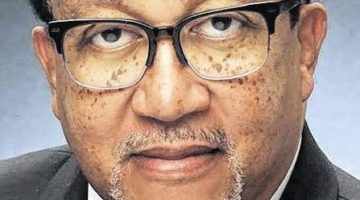The major fallacy surrounding Donald Trump’s victory in 2016 is that it was due to his supposed charisma and selfproclaimed business acumen. The truth is, as Ann Nelson points out in her book “Shadow Network,” it had little to do with Trump and everything to do with Christian fundamentalists such as Jerry Falwell Jr., Tony Perkins, Franklin Graham and Ralph Reed.
Up to a few months before the election, Trump had little chance of even winning the Republican nomination. The favorite of the “network” – the Council for National
Policy (CNP) created by Paul Weyrich 40 years earlier – were Ted Cruz and Ben Carson.
The pivotal moment came at “A Conversation about America’s Future with Donald Trump and Ben Carson” held June 21, 2016, at the New York Marriott Marquis hotel. That meeting set the stage for Trump’s being anointed “not as a man of God” but “as an instrument of God” who would “destroy” the hated existing system.
The goal was “saving the United States from further moral and spiritual cannibalization by the radical Left …,” said pollster George Barna.
The agenda included opposition to abortion, along with same-sex marriage, as well as appointment of conservatives to the U.S. Supreme Court, limited government and “religious liberty” – promoted by glaring lies such as Hillary Clinton supported full-term abortion.
The fundamentalists knew of Trump’s character flaws but, Nelson reports, Graham told participants that, in her words, “the God of the Old Testament worked through lots of sinners: Abraham lied, Moses disobeyed God. David committed adultery and had a man killed.”
Perkins heavily promoted Trump, who, in turn, gave the network what it wanted, including creating an Evangelical Advisory Board. After the network was able to coopt the Republican Party and Trump won the nomination, it was the organization which drafted the platform on which he would run. “It is said to be the most conservative platform by any political party in American history,” the CNP Action newsletter reported.
Also, Nelson notes, Trump initially picked Chris Christie as his running mate but, under pressure from his handlers, he ditched the former New Jersey governor for fundamentalist Mike Pence so, Nelson says, “Trump could ride on his coattails.”
The CNP and its vast network of tens of thousands of evangelical pastors, massive media outlets, money changers and very sophisticated data gathering and application went to work to make Trump president at a time when Clinton had a comfortable lead.
With the network’s solid backing, Trump won a decisive 306 Electoral College votes, due to an all-important combined margin of 80,000 popular votes in Michigan, Pennsylvania and Wisconsin – less than 1 percent in each state. He immediately proceeded to build an administration comprising fundamentalists and sycophants and to eliminate or weaken all regulations disliked by the CNP and stack the federal judiciary with young, white ultra-conservatives.
With the Nov. 3 election less than two weeks away and Trump reeling from his failure to provide adequate leadership in the battle with the coronavirus and its devastating economic impact, the question is whether the CNP and its network can again pull off a surprising victory for their man in the White House, who, as in 2016, is trailing behind his 2020 opponent Joe Biden.
It is tempting to suppose that the record-breaking early voting – already totaling more than 30 million ballots – is a sign that Biden will win. But the long lines at polling stations could be reflecting a big turnout by Trump supporters, who, following his lead, deride masks and are willing to risk infection with in-person voting.
With all that said, the election will turn on just one factor: whether disgust with a president whom some regard as a boorish, narcissistic autocrat spouting lies and vitriol against perceived enemies is enough to overcome a genetic predisposition to protect ethnic “heritage.” In other words, white Americans, still the majority, will decide the outcome of the election. Whether they are telling pollsters the truth is another matter.
Trump evidently is not taking chances. He has been trying to discredit absentee balloting, claiming, without evidence, that it allows for rigging, thus laying the foundation for a legal challenge. That is why he is refusing to say that he will accept defeat if he loses. He insists that can happen only if there is electoral fraud. Thus, if he loses by a wide margin, it would be due to rigging and; if he loses by a narrow margin, ditto.
There is also concern that violence will erupt if Biden wins, especially since Trump has not categorically denounced armed white supremacists and militias, some of whom have made it clear they stand ready to be called into action. Any such violence could provide a pretext for declaring martial law but Americans will not tolerate such a gambit, including the military.
In any case, whether he wins or loses, the legacy which Trump and the Republican Party will leave is a nation even more polarized than ever. Even more, in his inflammatory speeches and his disdain for the traditional norms of political behavior and the four-year-long astounding acquiescence of the Republican leadership, Trump has so weakened the institutions of American democracy that, whether in or out of office, he has set the stage for a kind of politics seen only in unstable countries.
He has had a lot of help doing it from selfprofessed patriotic men and women of God. History will judge them harshly.











No Comment